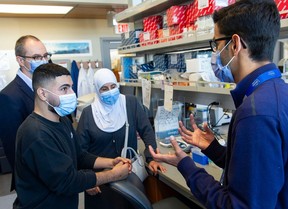Rare Medical Condition Diagnosed, British Columbia Research Institute
"Kids with rare diseases go on a diagnostic odyssey where they see specialist after specialist, go through painful test after painful test and still can't find an answer."They [clinicians looking after the patient] were able to come to our research institute where we could apply cutting edge, research-based technology.""Through that, we found Ebrahim had a change in this gene and that he lacked a protein that's critical for controlling the way the joints grow, the way the immune system works."Dr. Stuart Turvey, pediatric immunologist, clinician-scientist, B.C. Children's Hospital Research"Imagine not knowing what's causing [a health problem] and then finding the answer; it's a pretty big deal.""It's a big deal to them, but also for any future patient that might have something very similar.""It's been a long journey and it must be quite a relief."Mehul Sharma, doctoral student researching immune deficiencies, study author
 |
Researchers and doctors at the Children's Hospital Research Institute in British Columbia made quite the discovery; a previously unknown genetic condition. Ebrahim Aldalati, now 23, came to Canada as a refugee with his family eight years ago. They fled Syria for Jordan to escape the civil war. Until they were able to move to Canada as refugees. The young man, now living in Vancouver with his family, seemed normal as a toddler. Eventually he began experiencing problems bending his left leg, then his knees, and his elbows and finally his hips.
He had his first surgery for tightening of the tendons and joints at age ten. "For years, doctors tried so hard to find it (the reason for his difficulty in normal movements}. I'm really happy they've found out what's wrong because they can help other kids now", he explained. The condition was diagnosed as a complete lack of NFAT1 -- nuclear factor of activated T cells -- vital to the body's immune response and growth of cartilage cells.
 |
| Ebrahim Aldalati, 23, (second from left) and his mother, Falak Aldalat,i meet with researchers Dr. Stuart Turvey (left) and Dr. Mehul Sharma (right) at the B.C. Children’s Hospital Research Institute in Vancouver. Photo by Jason Payne /PNG |
Ebrahim's joints swelled since the time he was a young boy. The condition also led to two diagnoses of cancer in the last four years. Never before has a complete deficiency of NFAT1 been documented in an individual. The result of the team's research and identification of the first known case of the utter lack of MFAT1was published in the journal Blood, last month.
It began when the clinicians and doctors who attended on Aldalati realized they were being confronted with a medical condition no one had ever before seen. Science has been aware for decades that laboratory mice with Aldalati's condition developed abnormalities in their joints along with immune-system deficiencies, developing higher rates of cancer. A one hundred percent NFAT1 deficiency in a human, however, had never been documented before.
 |
One in seven billion: First-in-the-world diagnosis a result of incredible teamwork The University of British Columbia |
Labels: British Columbia, Children's Hospital Research Institute, Nuclear Factor of Activated T Cells, Unique Medical Condition

0 Comments:
Post a Comment
<< Home